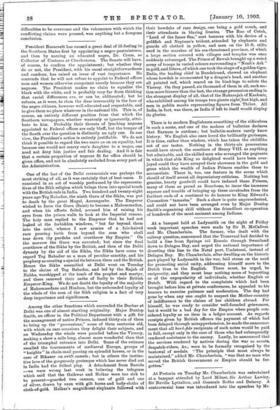At a banquet held at Ladysmith on the night of
Friday week important speeches were made by Sir H. McCallum and Mr. Chamberlain. The former, who dealt with the railway question, announced that the Transvaal had decided to build a line from Springs via Ermelo through Swaziland down to Delagoa Bay, and urged the national importance of diverting this line to the Natal port, Umlatoosi, instead of Del agoa Bay. Mr. Chamberlain, after dwelling on the historic part played by Ladysmith in the war, laid stress on the need for promoting social unity, addressing himself more to the. Dutch than to the English. There must, he urged, be reciprocity, and they must hear nothing more of boycotting or of the unpopularity of individuals, whether English or Dutch. With regard to the complaints which had been brought before him at private conferences, he appealed to his hearers to exercise patience and moderation. The day had gone by when any one ought to suspect the Mother-country of indifference to the claims of her children abroad. For himself, he was ready to consider well-founded grievances, but it would be a bad day for the Empire when people con- sidered loyalty as an item in a ledger account. As regards receipts given by British officers the payment of which had been delayed through misapprehension, he made the announce- ment that all bonci-fide recipients of such notes would be paid in full, except only in the case of those who had subsequently rendered assistance to the enemy. Lastly, he announced that the services rendered by natives during the war as scouts, despatch-riders, &c., were to be formally recognised by the bestowal of medals. " The principle that must always be maintained," added Mr. Chamberlain, "was that no man who served the British Government or Empire should be for- gotten."






































 Previous page
Previous page